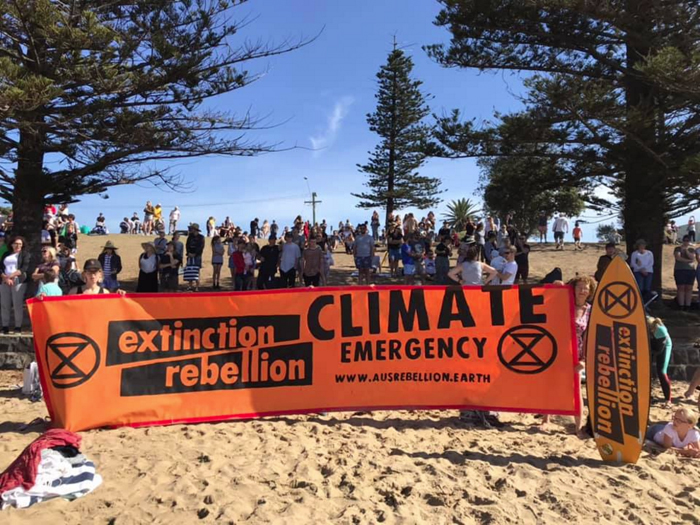The Climate Justice Network takes on a brief for future generations

Last week Hobart put itself in the history books by becoming the first Australian state capital to declare a climate and biodiversity emergency. Take a bow, councillors.
Words are cheap, as critics of the declaration may point out, but these ones come on top of decades of practical effort by the city to reduce its carbon footprint and encourage residents to do likewise. The same cannot be said of administrations further up the chain, in both Hobart and Canberra.
One outcome of the declaration will be letters to prime minister Scott Morrison and premier Will Hodgman asking both governments to make deep emissions cuts their top priority and, crucially, to support vulnerable people and communities in the shift to a low-carbon economy.
Social and economic inequity has given rise to the concept of a “just transition” as the economic cost of climate change and the unequal burden it imposes on communities become ever clearer.
If equality was ever part of our national identity, it isn’t any more. OECD statistics show that in Japan and some Scandinavian countries the richest 20 per cent are less than four times wealthier than the poorest 20 per cent. In Australia the wealth difference is seven times.
UN and World Bank data reveal that three-quarters of the world’s richest people – the 10 per cent holding over half of global wealth – are from North America, Europe, Japan, Australia and New Zealand. The poorest 50 per cent, sharing just eight per cent of income – live almost exclusively in China, India and less developed countries.
Unequal income distribution between nations is central to the world’s response to climate change, which last year’s UN report on 1.5C of warming said would have its greatest impact among poor and vulnerable people and countries.
That impact is already threatening the viability of communities. In India, record-breaking heat and drought have left many villages and some cities, notably Chennai, desperately short of water. In some states villages have been evacuated and people are attacking others just to get a drink.
Similar desperate scenes are playing out in drought-stricken east Africa, while on Arctic coasts, Asian river deltas and oceanic islands, floodwaters and rising seas are increasingly displacing communities of subsistence farmers and fishers.
But even in rich countries economic protections can vanish overnight. Witness the havoc wreaked by devastating US hurricanes, tornadoes and monstrous floods, or still-uninhabited, burnt-out Paradise, California, or near-waterless outback Australian communities. In all cases the poor, powerless and uninsured carry the heaviest load.
The greatest inequity cuts across all of these, and it is growing wider and deeper with each passing year in which authorities fail to think ahead and plan comprehensively for a climate-disrupted future. This is the generational divide, and bridging it is becoming a matter of urgency.
In a new research paper in the University of Tasmania Law Review, Law School academics Jan Linehan, Peter Lawrence and Nicky Van Dijk write of balancing “the needs and aspirations of those currently alive and those of future generations”.
Legal questions aside, most people would understand what this means. If older generations whose wealth is based on fossil fuel don’t do what’s necessary to live without it, now, later generations may find adaptation impossible. If we do cut emissions we’re taking some sort of responsibility for people yet to be born. That’s intergenerational justice.
This is no esoteric point about a remote future. Today’s young people see all too clearly that the failure of my generation to mitigate carbon pollution threatens their future. With no formal political power, they see no option but to ignore their elders and take direct action.
Movements like School Strike for Climate, Fridays for the Future and Extinction Rebellion are the organised face of anxious, angry youth. Some of them are risking their lives to halt traffic or coal trains or aircraft because they see what so many of us refuse to: that this is truly a life and death issue.
They are not alone. Taking up their cause, the Hobart-based Climate Justice Network is exploring the appointment of a publicly-funded commissioner for future generations for Tasmania, similar to positions currently operating in New Zealand and Wales.
This and other ideas will be discussed on Thursday at two “Voices of the Future” forums at the Hobart Town Hall. At 3.30 pm Van Dijk and fellow law student Salman Shah will lead a discussion for young people seeking substantive, long-term advances that will address their genuine concerns.
The second forum, open to the public, begins at 6.30 pm. Guest speakers include Jonathan Boston, a New Zealand public policy specialist; Peter Davies, a Welsh authority on sustainable development; and Hobart-based scientist and educator Mel Fitzpatrick.
On Friday the UTAS Law School is hosting an expert forum seeking to formulate policies for representing future generations and young people in climate change planning. Further details here.
